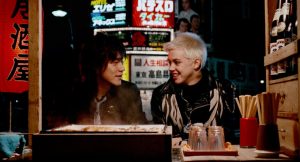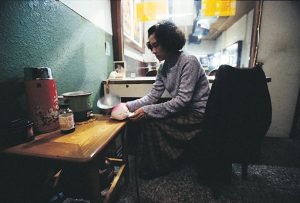
A few years before she directed a soon-to-be pop-culture touchstone in the 1992 film Buffy the Vampire Slayer, Fran Rubel Kuzui helmed her debut feature Tokyo Pop, a charming picaresque that has languished largely in cult obscurity for 35 years. A 4K restoration, supported through the Jane Fonda Women Directors Fund, opened in New York City and Los Angeles this past August, and is now available to everyone on a gorgeous, if bare-bones, Blu-ray disc (Kino, $19.99).
Carrie Hamilton, daughter of Carol Burnett, stars as Wendy Reed, a musician in the downtown New York scene of the 1980s who, fed up with being relegated to background vocals in lousy rock acts, ditches both her band and her boyfriend for the allegedly hospitable musical climate of Japan. Hoping to start up a band in a city infatuated with American culture, she arrives in Tokyo all but penniless, finds lodging in a ryokan covered floor-to-ceiling in Mickey Mouse paraphernalia, and acquires a job in a boozy karaoke club.
Buoyed on the winds of chance, Wendy meets Hiro (Yutaka Tadokoro), a Jaggeresque singer obsessed with Western pop music, whose own cover band has been enduring a similar failure to launch. So begins a romance of sorts, but it’s the duo’s creative collaboration that most sets a fire under Kuzui (who wrote the delightful screenplay with Lynn Grossman). Wendy’s looks as a fetishized American It Girl lend the group something like overnight fame, but the band’s repertoire — traditional covers of yellowing pop nuggets like “Do You Believe in Magic?” — is hardly the sort of fare she fled a continent to pursue.
Finding a niche somewhere between Susan Seidelman’s scrappy punk debut Smithereens and the tuneful love story Once, Tokyo Pop situates the caprices of the music industry as just another product in the global marketplace. But it’s also an affectionate and amusing travelogue, as Wendy is spirited through Japan’s cultural byways: tourist tchotchke shops, Buddhist shrines, hibachi restaurants and hot springs. The brief glimpse we are granted of Hiro’s family, whose various members have embraced American-style aerobics exercises and fast food, reveals that cultural exchange goes both ways.
There’s a certain naivete at the heart of Tokyo Pop that is clearest when exploring how Wendy and Hiro make and distribute their music. But this innocence only enhances the movie’s whimsical, can-do spirit. It’s a movie about an artist who finds her voice by helping a fellow artist find his. It’s enough to make anybody want to start a band.
* * *

Tsai Ming-liang released his masterpiece Goodbye, Dragon Inn in 2003, and viewed from today’s hindsight, in a lovely and generous Blu-ray release from Metrograph Pictures ($24.38), it’s clear that its director saw the writing on the wall for the withering movie-theater industry. It’s an unorthodox ghost story; its first line of dialogue, which, in typical austere Tsai fashion, takes place 45 minutes into the film, is the question, “Do you know this theater is haunted?” But it’s also an elegy for the cinema itself, as a physical structure and a communal gathering place, whose decline in the 20 years since the movie’s release has been steep and inexorable.
Goodbye, Dragon Inn is set in and around a crumbling neighborhood theater in Taipei, which is evidently closing with a repertory screening of Dragon Inn, King Hu’s 1967 wuxia classic and a landmark of Taiwanese cinema. Like Tsai’s other films, it’s a plotless ramble, anchored by two recurring characters: A ticket taker (Chen Shiang-chyi) with a pronounced limp, and a Japanese tourist (Mitamura Kiyonobu) who mistakes the largely empty theater for a cruising spot, only to encounter a rogues’ gallery of fellow-patrons, not all of whom appear to be flesh-and-blood.
These include a pair of women obnoxiously eating food during the screening, another patron who puts her bare feet up on the chair next to his, and even two actors from Dragon Inn, now decades older, who seem to have drifted from the projected film into Tsai’s film. If there’s a main character in Goodbye, Dragon Inn, it’s the formerly grand movie palace itself, which increasingly seems to exist out of time; it is its own self-contained metaverse, before such a term existed.
Like Tsai’s other slow-cinema experiments, Goodbye, Dragon Inn requires, and rewards, patience. His shots can be so long and uneventful as to lull us into a state of meditative complacency, attuning our eyes and ears to even the minutest variations. That said, there is plenty of wry humor that relies on deftly staged sight and sound gags, with Tsai’s deep-focus photography, layered with information, recalling that of Welles, Tati and Lean. Its soundscape is a masterly mixed mélange of clanging swords and dialogue from the movie-within-the-movie, combined with the rhythmic thuds of the ticket-taker’s unsteady gait and incongruous sounds of heavy industry—metallic wheezes from a dying building.
It’s Tsai’s M.O. to keep his audience perpetually off-balance. As characters appear and disappear, the living and the dead begin to seem indistinguishable, including a cameo, late in the film, of Tsai regular Lee Kang-sheng as a projectionist. As ghosts, they’re a benign bunch, whose scariest acts involve, say, cracking nuts in a public theater and disrupting the experience for the living. But there’s no doubt they are where they’re supposed to be.
In paranormal lore, there often is talk of earthbound souls stuck in feedback loops, forever repeating the same actions. In this way, the movie theater, hurtling as it is toward its obsolescence, enjoys a second life as an eternal entertainment hub — a balm for the spirit world.
This Blu-ray is a must for Tsai fans; its bonus features include the director’s structuralist 2019 short film Light, a brief video introduction from film critic Nick Pinkerton, and an immeasurably insightful audio commentary from critic Phoebe Chen.